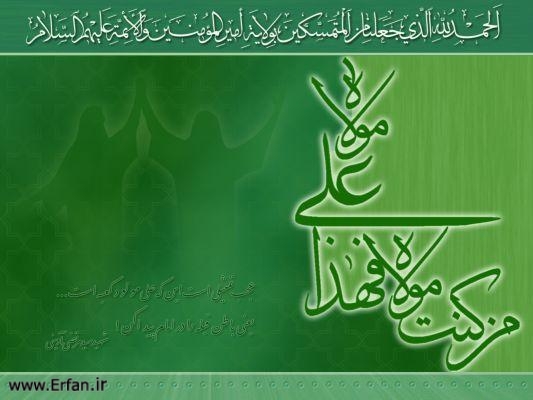Wilayat : Spiritual vs Political

The learned sholar's article in the Bio-Ethics Encyclopaedia (in which he wrote that the Prophet Muhammad "had left no explicit instruction regarding sucession to his regious-political authority") generated heated discussion among the commuity. The responses that the learned scholar wrote to the community and the comments he subsequently made in the majlises of Muharram 1419 at Toronto, portray the confusion about the concept of wilayat.
(A) "Spiritual Only, Not Political"
First the learned scholar claimed that the wilayat of the Prophet and the Imams was only spiritual and not political. He said:
By the way, the Prophet (s. a. w.) was never recognized as the political leader. No, that is not correct at all. He was recognized as Rasulullha, the envoy of God, the Messenger of Allah (a,t). There was no politics there was no political language attached to it. It isn't that what the mordens are telling us; the way Iran is telling us time and again that the Prophet was political leader. No, He was recognized fundamentally and essentially as a prophet of God.1
"Task of prophethood was to lead the society to perfection. And that perfection could not be done individually -- it had to be done as members of the community, the sunnah. Ummah means a community under the Prophet as prophet, not a political leader.
"Now we know why 'man kuntu mawlahu fa hadha Aliyn mawlahu' meant something very very important. The Prophet (s. a. w.) could have said, man kuntu khalifa fa hadha khalifa'. He could have said, man kuntu hakiman fa hadha hakiman.
He is not using any of the terminology that we would use in the mormal political sense of carrying on the authority of the political lerader ... .
"Look at the word chosen by Allah (s.t) for guidance. After all the Prophet is ' ma yantiqu 'anil hawa in huwa illa wahyun yuhaa.' He is given instructions. 'Mawla': what does the word 'mawla' mean? Allah (s.t.) says in the Qur'an 'wal kafirun lays lahum mawla.' The disbeliever has no mawla. They don't have a mawla---they don't have a protector, they don't have a parton, they don't have somebody who cares for them. This is the meaning of mawla ..."2
The learned scholar says that nubuwwat did not include political leadership and that word mawla used by the Prophet in Ghadir did not mean khalifa (political successor) or hakim (ruler). In other words he is excluding the third dimension of wilayat from the term "mawla" and restricting it to the second dimension (i.e., spiritual guidance). In his attempt to convince his audience, he makes up hypothetical and grammatical incorrect Arabic sentences which make no sense. For example, the sentence "man kuntu [lahu] khalifa fa hadha [lahu] khalifa---- for whomsoever iam his successor, this is his successor." Was the Prophet "khalifa---successor" of any one from the audience? Of course, not; and that is why he did not use the term "khalifa" in the hadith of Ghadir.
As discussed in one of the previous chapters, to understand the meaning of mawla as uesd by the Prophet for Imam 'Ali, one does not have to go far. Just ponder upon the question he asked the Muslims before presenting 'Ali as their "mawla": he asked them, "Do I not have more authority over you then you have over yourselves? A lastu awla bi kum min anfusikum?"3 When they replied by saying, "Certainly,O Messenger of Allah," then he said, Man kuntu mawlahu fa hdha 'Aliyun mawlahu---- Of whomsoever I am the master, this Ali is his master." Prophet Muhammad (s.s.w.) is surely talking about a master who has more authority (awla) over the people than they have over themselves, and that includes authority in political matters also. And therefore, there was no need for the Prophet to say,'Man kuntu [alayhi] hakiman, fa hadha ['aliyahi] hakiman.'
The learned scholar continues his talk:
"The Prophet (s.a.w.) when he introduces Imam 'Ali's authority in the community, what does he say? 'Man kuntu mawlahu fa hadha 'Aliyun mawlahu.' What he means is that 'whoever regards me as a perfect example to be followed to the ultimate goal of salvation, 'Ali is the man who should be followed.' The question was of obedience. Mawla, one who should be obeyed, one who should not be disregarded. In the sense, Allah is Mawla. Allah is the Mawla of deen, that path on which you cannot afford to disobey Allah (s.w.t.) ... ."4
Is this following and obedience restricted to spiritual matters and does it not include social-political issue?
____________
1. This is again an example of saying one thing in his acadamic work and saying something else when talking to the Shi'a community. Dr. Sachedina, as mentioned earlier, has written in Islamic Messianism the Islam began as political movement and later on acquired religious emphasis. now he is saying that the Propeht was recognized fundamentally as a prophet of God and was never recognized as political leader.
2. Dr.Sachedina's 2nd speech of Muharram 1419 in Toronto. He has perhaps inadvertently quoted the Qur'anic verse incorrectly, it is not wal kafirun laysa lahum mawla,' it is wa anna l-kafirin la mawla lahum.' (47:11)
3. This question of the Prophet is based on the verse 33:6 of the Qur'an.
4. 2nd speech in Toronto, Muharram 1419.
